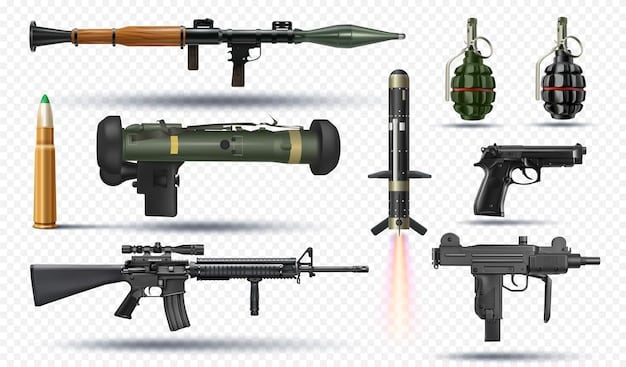Gun Control Debate: Proposals & Impact on US Public Safety

The gun control debate in the US revolves around various proposals, including universal background checks, assault weapon bans, and red flag laws, each with potential impacts on public safety and Second Amendment rights.
The gun control debate: what are the current proposals and their potential impact on public safety? This complex issue continues to spark passionate discussions in the United States, particularly in light of recurring mass shootings and concerns about rising gun violence.
Understanding the Gun Control Debate in the US
The gun control debate in the United States is a complex and multifaceted issue, deeply rooted in the country’s history, culture, and legal framework. It encompasses a wide range of perspectives, from those who advocate for stricter regulations to prevent gun violence to those who defend the right to bear arms as enshrined in the Second Amendment. This section will delve into the core arguments and historical context that shape this ongoing debate.
The Second Amendment to the United States Constitution guarantees the right of the people to keep and bear arms, a right that has been interpreted differently over time. Some argue that this right is absolute and applies to all individuals, while others believe it is subject to reasonable restrictions to ensure public safety. Court decisions, such as District of Columbia v. Heller (2008) and McDonald v. City of Chicago (2010), have affirmed the individual right to bear arms but have also acknowledged the government’s power to regulate firearms.

Historical Context
The history of gun control in the US dates back to the National Firearms Act of 1934, which regulated machine guns and other weapons. Subsequent legislation, such as the Gun Control Act of 1968, further restricted the sale of firearms. However, these laws have been challenged and debated extensively, leading to a patchwork of federal, state, and local regulations.
The debate intensified in the late 20th and early 21st centuries, driven by high-profile mass shootings and growing concerns about gun violence. Events such as the Columbine High School massacre in 1999, the Virginia Tech shooting in 2007, and the Sandy Hook Elementary School shooting in 2012 spurred renewed calls for stricter gun control measures. These events also fueled counter-movements advocating for the protection of gun rights.
- Public opinion on gun control is divided, with significant differences based on political affiliation, geographic location, and demographics.
- Advocates for stricter gun control argue that it is necessary to reduce gun violence and save lives.
- Opponents of stricter gun control argue that it infringes on the Second Amendment and does not deter criminals.
The ongoing debate reflects fundamental differences in values and priorities, making it one of the most contentious issues in American politics. Understanding the historical context and core arguments is essential to grasping the complexities of the gun control debate in the US.
In conclusion, the gun control debate in the US is deeply rooted in historical interpretations of the Second Amendment, shaped by tragic events, and fueled by differing values. Navigating this complex issue requires an understanding of its historical context and the core arguments that shape the ongoing discussion.
Current Gun Control Proposals Under Consideration
Several gun control proposals are currently being considered at the federal and state levels in the United States. These proposals aim to address various aspects of gun violence, ranging from background checks to restrictions on certain types of firearms. This section will examine some of the most prominent proposals and their potential impact.
One of the most widely discussed proposals is universal background checks, which would require all gun sales, including those between private citizens, to go through a licensed dealer who performs a background check. This measure is intended to prevent individuals with criminal records or mental health issues from purchasing firearms.
Universal Background Checks
Universal background checks are supported by a majority of Americans and have been implemented in several states. However, opponents argue that such checks are burdensome and ineffective, as criminals can still obtain guns illegally. They also raise concerns about the privacy of gun owners.
Assault Weapons Ban
Another proposal gaining traction is a ban on assault weapons, which are defined as semi-automatic rifles with certain military-style features. Supporters of an assault weapons ban argue that these weapons are designed for combat and have no legitimate civilian purpose. They point to the fact that assault weapons have been used in many mass shootings.
Opponents of an assault weapons ban argue that it infringes on the Second Amendment and that these weapons are commonly used for hunting and self-defense. They also argue that a ban would not be effective, as criminals can still obtain other types of firearms.

- Red flag laws, also known as extreme risk protection orders, allow law enforcement or family members to petition a court to temporarily remove firearms from individuals who are deemed a danger to themselves or others.
- These laws have been adopted in several states and have been credited with preventing suicides and mass shootings.
- Opponents argue that red flag laws violate due process rights and can be abused.
These proposals represent a range of approaches to addressing gun violence, each with its own potential benefits and drawbacks. The debate over these measures is likely to continue as policymakers grapple with the complex issue of gun control in the US.
In conclusion, current gun control proposals under consideration include universal background checks, assault weapons bans, and red flag laws. Each proposal aims to address specific aspects of gun violence, but also faces opposition based on Second Amendment concerns and questions about effectiveness.
The Potential Impact of Universal Background Checks
Universal background checks are a key component of many gun control proposals, aimed at preventing firearms from falling into the hands of individuals legally prohibited from owning them. This section will explore the potential impact of implementing such a system, weighing the arguments for and against its effectiveness.
The primary goal of universal background checks is to close loopholes that allow individuals to purchase guns without undergoing a background check. Currently, federal law requires licensed gun dealers to conduct background checks on prospective buyers through the National Instant Criminal Background Check System (NICS). However, private gun sales, which occur at gun shows or online, are often exempt from this requirement.
Reducing Gun Violence
Advocates of universal background checks argue that expanding the background check system to cover all gun sales would prevent criminals, domestic abusers, and individuals with mental health issues from obtaining firearms. They point to studies that suggest states with universal background checks have lower rates of gun violence.
- Opponents of universal background checks argue that they would not be effective in preventing crime because criminals can still obtain guns illegally.
- They also raise concerns about the privacy of gun owners, arguing that a universal background check system would create a de facto gun registry.
- Additionally, some argue that universal background checks would be difficult to enforce, particularly in rural areas where private gun sales are common.
The impact of universal background checks on gun violence is a subject of ongoing debate. Research suggests that they may contribute to reducing gun violence, but the extent of their effectiveness remains unclear. The debate over universal background checks reflects fundamental differences in values and priorities, with supporters emphasizing public safety and opponents emphasizing individual rights.
In conclusion, the potential impact of universal background checks is a complex issue with arguments both for and against their effectiveness. While proponents argue they can reduce gun violence by preventing prohibited individuals from obtaining firearms, opponents raise concerns about their impact on privacy and enforcement.
Assessing the Effectiveness of Assault Weapons Bans
Assault weapons bans are another frequently debated gun control measure, designed to restrict or prohibit the sale and possession of certain types of semi-automatic rifles and high-capacity magazines. This section will assess the potential effectiveness of such bans in reducing gun violence.
The term “assault weapon” is often used to describe semi-automatic rifles with military-style features, such as pistol grips, adjustable stocks, and high-capacity magazines. These weapons have been used in several high-profile mass shootings, leading to calls for a ban on their sale.
Potential Benefits
Supporters of an assault weapons ban argue that these weapons are particularly dangerous because they are designed for combat and can inflict mass casualties quickly. They point to research suggesting that assault weapons bans reduce gun violence.
For instance, a study by the Giffords Law Center to Prevent Gun Violence found that states with assault weapons bans have lower rates of mass shootings. However, other studies have found that assault weapons bans have a limited impact on overall gun violence rates.
- Opponents of assault weapons bans argue that they infringe on the Second Amendment and that these weapons are commonly used for hunting and self-defense.
- They also argue that a ban would not be effective, as criminals can still obtain other types of firearms.
- Additionally, some argue that the term “assault weapon” is politically motivated and that many of the features that define these weapons are cosmetic.
The effectiveness of assault weapons bans in reducing gun violence is a subject of ongoing debate. Research suggests that they may have a limited impact on overall gun violence rates, but they may be more effective in reducing mass shootings. The debate over assault weapons bans reflects fundamental differences in values and priorities, with supporters emphasizing public safety and opponents emphasizing individual rights.
In conclusion, assessing the effectiveness of assault weapons bans involves considering their potential to reduce gun violence, particularly in mass shooting events, against concerns about Second Amendment rights and the availability of other firearms. The debate reflects differing perspectives on the appropriate balance between public safety and individual liberties.
Red Flag Laws and Their Impact on Public Safety
Red flag laws, also known as extreme risk protection orders (ERPOs), are a relatively new type of gun control measure that allows law enforcement or family members to petition a court to temporarily remove firearms from individuals who are deemed a danger to themselves or others. This section will examine the potential impact of red flag laws on public safety.
Red flag laws are designed to prevent gun violence by intervening before a tragedy occurs. They allow concerned individuals to report potentially dangerous behavior to law enforcement, who can then seek a court order to temporarily remove firearms from the individual in question.
Preventing Gun Violence
Advocates of red flag laws argue that they can prevent suicides, mass shootings, and other forms of gun violence. They point to studies that suggest red flag laws have been effective in reducing suicides.
- Opponents of red flag laws argue that they violate due process rights and can be abused.
- They raise concerns about the potential for false accusations and the lack of due process protections for individuals who are subject to ERPOs.
- Additionally, some argue that red flag laws may not be effective in preventing gun violence because individuals who are determined to harm themselves or others can still obtain firearms illegally.
The impact of red flag laws on public safety is a subject of ongoing debate. Research suggests that they may be effective in reducing suicides, but the extent of their impact on other forms of gun violence remains unclear. The debate over red flag laws reflects fundamental differences in values and priorities, with supporters emphasizing public safety and opponents emphasizing individual rights.
In conclusion, red flag laws offer a potential mechanism for preventing gun violence by temporarily removing firearms from individuals deemed a danger to themselves or others, but their effectiveness and potential impact on due process rights remain subjects of debate.
Balancing Public Safety and Second Amendment Rights
The gun control debate in the US often centers on the challenge of balancing public safety concerns with the Second Amendment right to bear arms. This section will explore different perspectives on how to achieve this balance.
The Second Amendment to the United States Constitution guarantees the right of the people to keep and bear arms, a right that has been interpreted differently over time. Some argue that this right is absolute and applies to all individuals, while others believe it is subject to reasonable restrictions to ensure public safety.
Differing Perspectives
Advocates for stricter gun control argue that reasonable restrictions on firearms are necessary to reduce gun violence and save lives. They point to the fact that the US has a much higher rate of gun violence than other developed countries.
They also argue that the Second Amendment was written in a different era and that the types of weapons available today are far more dangerous than those available in the 18th century. Therefore, regulations on modern firearms are necessary to ensure public safety.
Opponents of stricter gun control argue that it infringes on the Second Amendment and does not deter criminals. They also argue that gun control laws punish law-abiding citizens and that the focus should be on enforcing existing laws and addressing the underlying causes of gun violence, such as mental health issues.
- Finding common ground in the gun control debate requires acknowledging the legitimacy of both sides’ concerns.
- This involves finding ways to reduce gun violence without infringing on the Second Amendment rights of law-abiding citizens.
- Potential solutions include investing in mental health care, improving school safety, and promoting responsible gun ownership.
The debate over gun control reflects fundamental differences in values and priorities. Finding common ground requires a willingness to listen to different perspectives and to seek solutions that respect both public safety and individual rights.
In conclusion, balancing public safety and Second Amendment rights requires acknowledging the legitimacy of both sides’ concerns and seeking solutions that respect both public safety and individual rights.
| Key Point | Brief Description |
|---|---|
| 🔑 Universal Background Checks | Require background checks for all gun sales to prevent prohibited individuals from acquiring firearms. |
| 💥 Assault Weapons Ban | Prohibit the sale of certain semi-automatic rifles with military-style features to reduce mass shootings. |
| 🚩 Red Flag Laws | Allow temporary removal of firearms from individuals deemed a danger to themselves or others. |
| ⚖️ Second Amendment Balance | Finding solutions that respect both public safety and individual rights, like mental health support. |
Frequently Asked Questions
▼
Universal background checks require all gun sales, including those between private citizens, to go through a licensed dealer who performs a background check. This aims to prevent criminals and other prohibited individuals from buying guns.
▼
An assault weapon is a semi-automatic firearm with military-style features, such as a pistol grip and high-capacity magazine. These weapons are often the focus of gun control debates due to their use in mass shootings.
▼
Red flag laws allow law enforcement or family members to petition a court to temporarily remove firearms from individuals who are deemed a danger to themselves or others, providing a legal avenue for intervention.
▼
The effectiveness of gun control measures is widely debated. Some studies suggest that certain measures, such as universal background checks, can reduce gun violence, while others argue that they have little impact.
▼
The main arguments against gun control include concerns about infringing on Second Amendment rights, the belief that gun control does not deter criminals, and the argument that it punishes law-abiding citizens.
Conclusion
The gun control debate in the US is a complex and deeply divisive issue, with various proposals under consideration. From universal background checks to assault weapons bans and red flag laws, each measure has potential benefits and drawbacks, and their impact on public safety remains a subject of ongoing debate. Finding solutions that balance public safety with Second Amendment rights is a critical challenge for policymakers and stakeholders alike.





